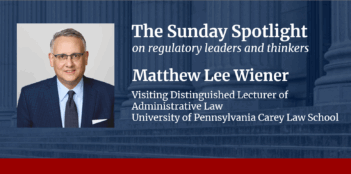
ACUS recommendations seek to improve the processes for hiring government lawyers.
Federal agencies depend on government attorneys to ensure that government operates fairly and lawfully. These lawyers draft regulations, investigate complaints, engage in litigation, and assess legal constraints on agency action.
In short, agency attorneys play a critical role in upholding the rule of law in the administrative state. It ought, then, to be straightforward to hire them.
But according to a recent study prepared by the staff of the Administrative Conference of the United States (ACUS), recruiting and hiring attorneys into the federal government is anything but straightforward.
The laws governing civil service hiring are complex. A number of rules, including merit system principles and qualifications standards, apply generally to all career civil service positions. The U.S. Office of Personnel Management (OPM), for example, must certify a list of potential candidates for a vacant competitive service position prior to hiring. Attorney hiring practices are subject to a multitude of exceptions from the general rules governing civil service hiring practices, further complicating attorney hiring. Still other rules, such as those governing the hiring of “preference eligibles” such as veterans, are applied differently to attorneys than to other positions.
This complexity can lead to inconsistency and confusion about how hiring rules are applied. Agency human resource departments may automatically apply rules to attorney hiring that are not required, while specialty attorney hiring offices may not. This disconnect imposes unnecessary barriers on attorney hiring.
Furthermore, agencies are not always aware of the opportunities for flexibility that are available for attorney hiring, such as the capabilities of the online talent acquisition system that many agencies use to post attorney positions, as well as opportunities to recruit former interns into full-time jobs.
In light of these challenges, and following a study of hiring practices for administrative law judges, ACUS sought to conduct a parallel study for attorney hiring. ACUS’s Office of the Chairman convened a roundtable with agency representatives and others with expertise in federal or attorney hiring. Two ACUS attorney advisors, Todd Rubin and Todd Phillips, drafted a report discussing the issues. I chaired the committee tasked with pursuing the issues raised. After a series of lively meetings this past fall, we developed a set of recommendations that the full ACUS body ultimately adopted as Recruiting and Hiring Agency Attorneys.
With these recommendations, ACUS intends to encourage best practices for attorney hiring. Some of the recommendations focus on helping agencies understand when they have flexibility, or when they must follow strict rules about hiring attorneys. To this end, ACUS recommends that agencies, such as OPM, the Merit Systems Protection Board, and the Office of Special Counsel develop trainings on these complex attorney hiring issues for other agencies. ACUS’s other recommendations outline a variety of ways in which agencies can develop recruitment strategies, as this is an area in which agencies have a lot of flexibility.
Still other ACUS recommendations attempt to address the disconnect between human resources departments and attorney hiring offices and to capitalize on the different skillsets of each. These recommendations focus on improving agencies’ processes for drafting vacancy announcements and evaluating applicants for open positions.
For example, in both drafting announcements and evaluating applicants, agencies should clarify which roles human resources officials will play and which roles attorney hiring officials will play. Hiring officials should take the lead in drafting and reviewing final vacancy announcements, ensuring that announcements are written in plain language and without inapplicable boilerplate language. Although human resources officials should screen applicants, hiring officials should determine the screening criteria.
ACUS also proposes ways for OPM to provide helpful information and reminders to agencies posting vacancy announcements through their talent acquisition system. OPM can help agencies write better job postings by encouraging agencies to use resources such as the federal Plain Language Guidelines and a prior ACUS recommendation, Plain Language in Regulatory Drafting.
In its report underlying its recent recommendations, ACUS also explains that OPM can clarify certain capabilities of USAJobs, the federal jobs portal, and encourage agencies to take advantage of this resource. For example, USAJobs requires applicants to submit a conventional resume, which may be easier to read than a clunky, system-generated resume.
ACUS’s final two recommendations address hiring processes for specific categories of attorneys. One category comprises new law school graduates who have previously served as interns in their agencies. Agencies should use the law clerk trainee position to hire former interns even before they have been admitted to the bar, explains ACUS. The second category consists of non-administrative law judge adjudicators. ACUS proposes that agencies develop special procedures to hire these adjudicators to ensure both impartiality and the appearance of impartiality.
Many of these recommendations may seem like they are getting into the weeds of attorney hiring. But when it comes to getting anything done, the weeds matter. These recommendations will help make it easier for agencies to hire excellent lawyers to serve in government, and for excellent lawyers to want to serve in government.
This essay is part of a five-part series on the Administrative Conference of the United States, entitled Seeking to Improve Administrative Transparency and Expertise.




